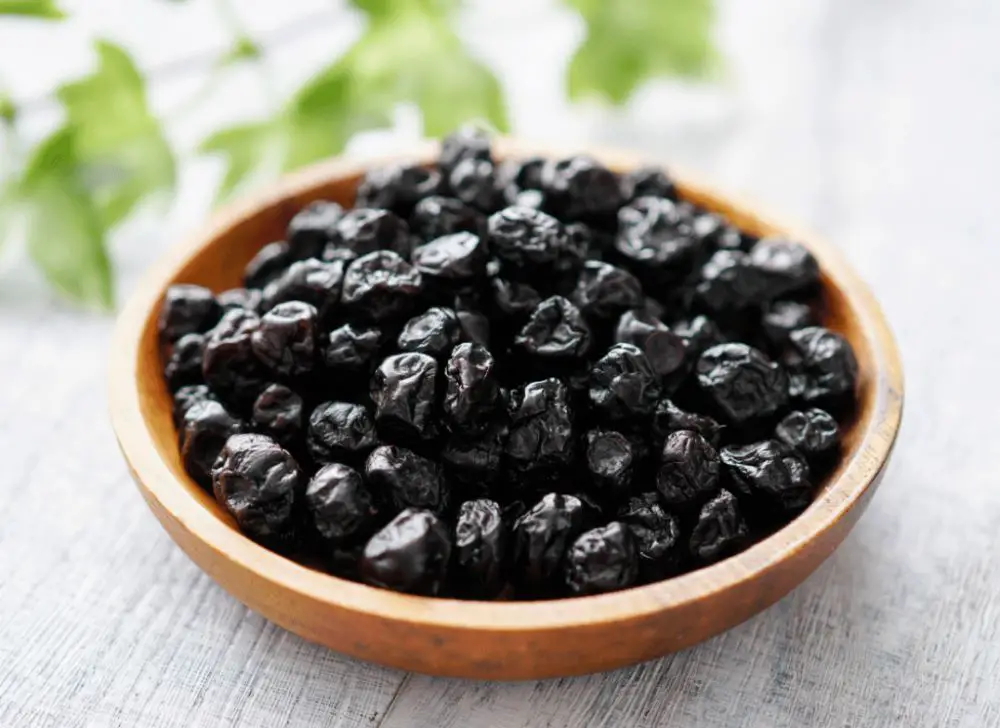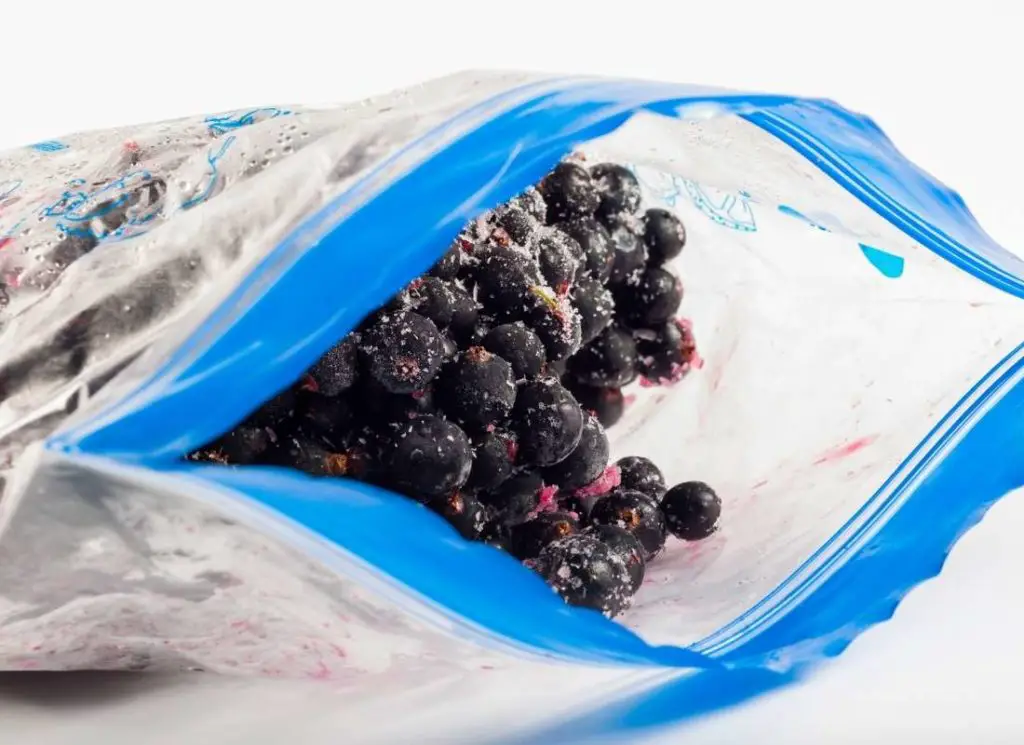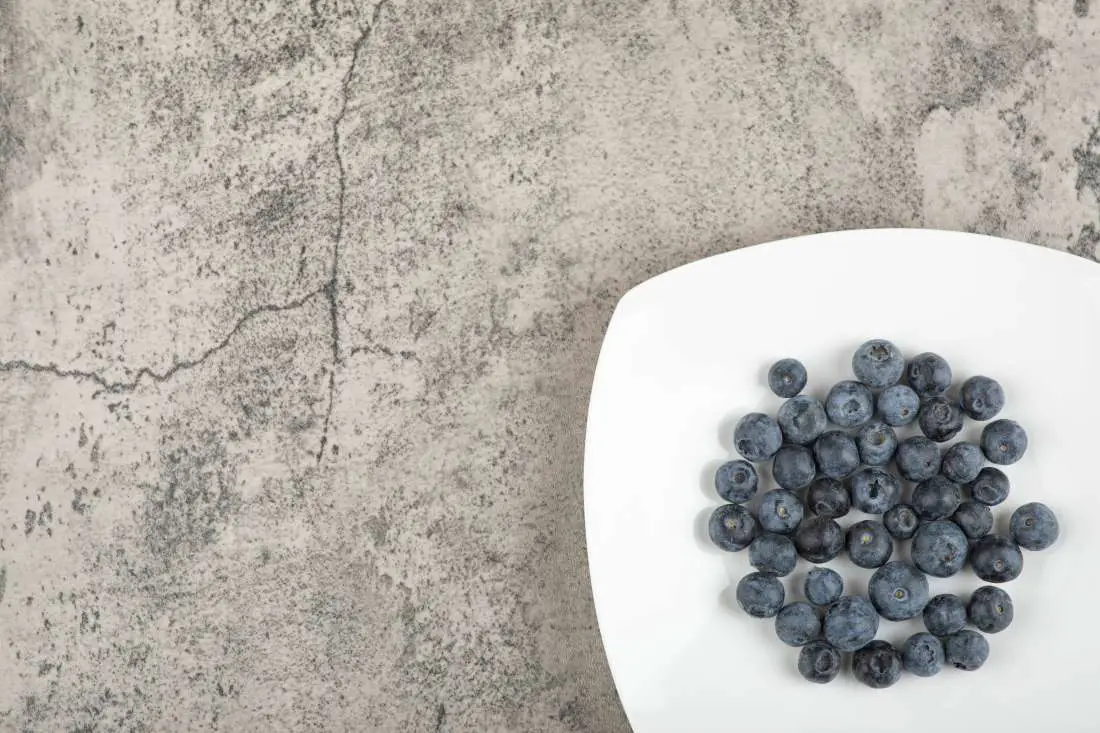Are blueberries low histamine? Can you enjoy their natural sweetness without fear of aggravating histamine intolerance? It’s a question you should ask if you’re a berry lover, and for good reason!
Blueberries are a colorful and flavorful addition to any meal. These bluish-purple orbs are packed with nutritional goodness. But if you have histamine intolerance, it’s important to know whether blueberries are likely to trigger histamine intolerance symptoms and whether they’re naturally high in histamines or other biogenic amines.
Unlocking the Health Benefits of Blueberries: Are They Low in Histamine and High in Antioxidants?
Here’s the good news. Blueberries are not known to be high in histamine or other biogenic amines. In fact, research shows blueberries are rich in a class of compounds called anthocyanins that have antioxidant and anti-inflammatory activity. (1) Blueberries are one of the best sources of anthocyanins, along with other purple fruits and vegetables like red cabbage.
Why is this important? High levels of histamine create a pro-inflammatory environment that anthocyanins in blueberries help counteract. Plus, blueberries are rich in other compounds with antioxidant and anti-inflammatory activity that offer other potential health benefits.
And there are other perks as well. Studies show that anthocyanins in blueberries modestly reduce systolic and diastolic blood pressure (2) and may lower the risk of cardiovascular disease too. These benefits may stem from the anti-inflammatory effects of anthocyanins and the way these natural compounds improve blood vessel function.
Do Blueberries Trigger Histamine?
Another concern with histamine intolerance is whether a food is a histamine liberator, meaning it can trigger the release of histamine from mast cells. There’s also no evidence that blueberries are histamine liberators.
As a physician, I’ve worked with many people with histamine intolerance, and most do not experience worsening of histamine intolerance symptoms when they eat blueberries. However, there are some caveats and precautions that I’ll point out below.
Some People Are Sensitive to the Salicylates in Blueberries
Although blueberries aren’t inherently high in histamine and are a low-histamine fruit, there are reports of histamine release from the mast cells of people who are sensitized to blueberries and experience food allergy symptoms when they eat the fruit. (3)
One way scientists measure this is by using a leukocyte histamine release test. They add extracts of a particular food, like blueberries, to white blood cells in a lab setting. If the person’s white blood cells release histamine, they’re sensitive to that food. The more histamine the cells release, the more severe that sensitivity is.
In the case of blueberries, there are anecdotal reports of people being sensitive to blueberries and releasing histamine, but there are no formal studies. (3) This does not appear to be common, though. People who are sensitive to blueberries are likely reacting to the salicylates, which are aspirin-like compounds in blueberries. Blueberries are a high-salicylate food. (8)
If you have histamine intolerance but aren’t sensitive to salicylates, you will probably tolerate blueberries well and may even get benefits from eating this food. But always do your own test and keep a food journal to see how you respond. The anti-inflammatory compounds in blueberries are more likely to be beneficial if you have histamine intolerance than a liability.

Avoid Dried Blueberries if You Have Histamine Intolerance
Are dried blueberries low histamine? It’s best to avoid dried fruit, as it offers no nutritional advantages over fresh. With the water removed, they’re a more concentrated source of sugar. Plus, dried fruit may contain sulfur dioxide or sulfites, which some people are sensitive to. Sulfur dioxide and sulfites are preservatives in dried fruit and other foods, including wine, olives, pickles, and fruit juice.
Even if a food contains only small amounts of these preservatives, some people are exquisitely sensitive to them and experience reactions. The U.S. Food and Drug Administration requires foods that contain more than 10 parts per million (ppm) of sulfur dioxide to say so on the label. (4)
You’re more likely to be sensitive to sulfites if you have asthma. Also, some people with histamine intolerance are also sulfite sensitive. If you have a history of sulfite sensitivity, stay away from all sources of these preservatives since the reaction can be severe. It’s not something you’re likely to outgrow or that will improve over time, either.
Are Frozen Blueberries Low Histamine?
Frozen blueberries are readily available and often less expensive than fresh ones. You can stock up when they go on sale and keep them in the freezer for months. Frozen blueberries are just as nutritious as fresh ones, if not more so. (9) They’re picked right after harvest when they’re most nutrient dense, and freezing stops nutrient loss.
A bowl of frozen blueberries likely contains more vitamin C than the fresh blueberries you get at the supermarket. Fresh ones sit on store shelves under bright lights that destroy vitamin C. Research also shows frozen blueberries have as many anthocyanins as fresh ones. So, you aren’t losing antioxidant and anti-inflammatory benefits through freezing either. (5)
It’s likely that frozen blueberries contain less histamine than fresh, especially if you let your blueberries sit around in the refrigerator for a few days. Why? As blueberries and other fruit mature and become riper, the histamine content increases as histamine-producing bacteria increase with age.

Besides Being a Low-Histamine Fruit, Blueberries Are Nutrient Dense and Easy on Your Blood Sugar
Beyond the low histamine content of blueberries, you get lots of nutrients when you eat a serving of berries. Blueberries are one of the most nutrient-dense foods you can add to your plate.
USDA research points out that blueberries may help preserve cognitive function related to aging. A Harvard observational study showed that eating a few servings of blueberries weekly could slow brain aging in women by several years. (6)
The USDA also points out the heart-health benefits of eating blueberries. Harvard researchers discovered that women who eat blueberries regularly may enjoy a 33% lower risk of heart attack. (6)
Plus, blueberries, with their fiber and antioxidants, have minimal impact on blood glucose, despite their natural sweetness. In fact, they may help improve blood sugar control. A study even showed that obese adults who consumed a smoothie with blueberries for 6 weeks had greater improvement in insulin sensitivity. (7) So, if you have diabetes or prediabetes, blueberries in moderation may be beneficial.
Are Blueberries Good for Histamine Intolerance?
Blueberries are low histamine, and they may even be beneficial if you have histamine intolerance because of their anti-inflammatory properties. Of course, you should eat them in small amounts initially and keep a food diary to see how you respond. We all have different sensitivities to foods, and you could react to some other component in blueberries, like the salicylates.
A few recommendations:
- Buy the freshest blueberries possible and eat them quickly. Don’t let them sit in the fridge and ripen too much.
- Even better, choose organic frozen blueberries. They’re just as nutrient-rich.
- Add blueberries to oatmeal (a low-histamine food) for more nutrients and anti-inflammatory benefits.
- Avoid dried blueberries.
- Also, avoid blueberry juice. It lacks fiber and is more likely to cause blood sugar spikes.
Enjoy low-histamine blueberries and other low-histamine foods! Find out whether pineapple is a low-histamine food.
References:
- Tena N, Martín J, Asuero AG. State of the Art of Anthocyanins: Antioxidant Activity, Sources, Bioavailability, and Therapeutic Effect in Human Health. Antioxidants (Basel). 2020 May 23;9(5):451. doi: 10.3390/antiox9050451. PMID: 32456252; PMCID: PMC7278599.
- García-Conesa M.T., Chambers K., Combet E., Pinto P., Garcia-Aloy M., Andresń-Lacueva C., dePascual-Teresa S., Mena P., Konic Ristic A., Hollands W.J., et al. Meta-Analysis of the effects of foods and derived products containing ellagitannins and anthocyanins on cardiometabolic biomarkers: Analysis of factors influencing variability of the individual responses. Int. J. Mol. Sci. 2018;19:694. doi: 10.3390/ijms19030694. https://pubmed.ncbi.nlm.nih.gov/29495642/
- Blueberry triggered histamine release [Units/volume] in Blood – LOINC. LOINC. Published 2021. Accessed February 11, 2022. https://loinc.org/7154-8/
- “CFR – Code of Federal Regulations Title 21 – Food and Drug ….” 06 Jan. 2022, https://www.accessdata.fda.gov/scripts/cdrh/cfdocs/cfcfr/CFRSearch.cfm?fr=182.3862.
- Lohachoompol, Virachnee. “The Change of Total Anthocyanins in Blueberries and Their Antioxidant Effect After Drying and Freezing.” BioMed Research International, vol. 2004, no. 5, Dec. 2004, pp. 248–52, doi:10.1155/S1110724304406123.
- Blueberries and Health : USDA ARS. Usda.gov. Published 2014. Accessed February 11, 2022. https://www.ars.usda.gov/plains-area/gfnd/gfhnrc/docs/news-2014/blueberries-and-health/
- Stull A. J. (2016). Blueberries’ Impact on Insulin Resistance and Glucose Intolerance. Antioxidants (Basel, Switzerland), 5(4), 44. https://doi.org/10.3390/antiox5040044.
- Puckey M. Low Salicylate Diet. Drugs.com. Published August 24, 2016. Accessed February 11, 2022. https://www.drugs.com/article/low-salicylate-diet.html
- ”Are frozen and canned fruits and vegetables healthy? – MSU ….” 28 Jun. 2018, https://www.canr.msu.edu/news/are_frozen_and_canned_fruits_and_vegetables_healthy.

